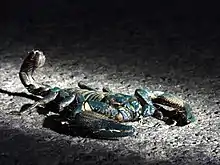| Heterometrus spinifer | |
|---|---|
 | |
| Asian Forest Scorpion at Goregaon Raigad | |
| Scientific classification | |
| Domain: | Eukaryota |
| Kingdom: | Animalia |
| Phylum: | Arthropoda |
| Subphylum: | Chelicerata |
| Class: | Arachnida |
| Order: | Scorpiones |
| Family: | Scorpionidae |
| Genus: | Heterometrus |
| Species: | H. spinifer |
| Binomial name | |
| Heterometrus spinifer | |
| Synonyms | |
| |
Heterometrus spinifer, the Asian forest scorpion, giant blue scorpion, or giant forest scorpion, is a species of scorpions belonging to the family Scorpionidae.[2]
Description
H. spinifer can reach a length around 10 to 12 cm (3.9 to 4.7 in).[3] The body is shiny black with gray-green reflections. The pincers are highly developed. In captivity it feeds primarily on insects, mainly cockroaches, crickets, and locusts.[4] Its venom can cause severe pain, and mild numbness in the affected area, but it is not typically lethal to humans.[4] These scorpions tend to be skittish and defensive, using their large pedipalps (pincers) to attack, more than their tails.
Distribution and habitat
This species can be found in Southeast Asia,[3] including Malaysia, Thailand, Indonesia, Cambodia, Vietnam, Sri Lanka, India, and other Southeast Asian countries .[4] Generally, these terrestrial scorpions live in moist forests in the dark undergrowth under logs or other debris, and they burrow into the ground where they hide during the day.[4]
Captivity
The Asian Forest Scorpion is commonly kept in the pet trade due to its low venom toxicity [5] and large size.
References
- ↑ Biolib
- ↑ Hemprich & Ehrenberg, 1828 : Zoologica II. Arachnoidea. Symbolae physicae seu icones et descriptiones animalium evertebratorum sepositis insectis quae ex itinere per Africam borealem et Asiam occidentalem. Berolini: Officina Academica.
- 1 2 Exotic Pets
- 1 2 3 4 WikiPets
- ↑ Lebrun, Bruno; Romi-Lebrun, Régine; Martin-Eauclaire, Marie-France; Yasuda, Akikazu; Ishiguro, Masaji; Oyama, Yoshiaki; Pongs, Olaf; Nakajima, Terumi (1997). "A four-disulphide-bridged toxin, with high affinity towards voltage-gated K+ channels, isolated from Heterometrus spinnifer (Scorpionidae) venom". Biochemical Journal. 328 (Pt 1): 321–327. doi:10.1042/bj3280321. PMC 1218924. PMID 9359871.
External links